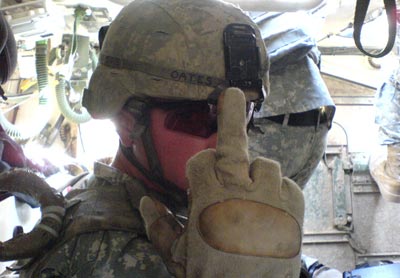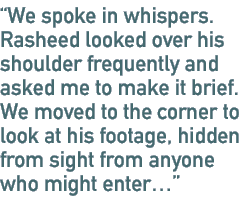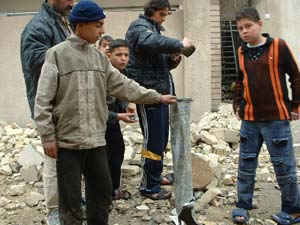Fixers have long worked with foreign reporters in war zones, translating, booking hotel rooms, scheduling interviews, providing expertise on what's happening on the ground, acting as security advisers, and in the case of Gangs of Iraq, filming in places where few Western TV crews dare to set up a tripod. In Iraq, it's a particularly dangerous job. The statistics are grim. Of the 100 journalists killed since the war began, 79 were Iraqi. Many of them were fixers working for Western news organizations like Newsweek or CNN.
These are the stories of some of the Iraqi fixers who worked for us during the making of Gangs of Iraq. I've changed Othman's and Rasheed's names to protect their identities.
Jaff
We arrive in Baghdad on the eve of Saddam's sentencing for crimes against humanity. It's Nov. 4, 2006. Dozens of journalists have crowded the lobby of the Al Rasheed Hotel. They expect a curfew to be imposed once the verdict is read and want to make sure they have a place to sleep and work. If there is a lockdown, nobody will be able to leave or enter the Green Zone for days.
Check-in takes hours. The hotel manager thumbs through a thick printout, crossing off room numbers and slowly inputting each journalist's name, nationality, passport number, and phone number into a computer that is as large as my suitcase. The manager doesn't know how to type, so with one index finger he slowly punches keys, producing a glow-in-the-dark chartreuse code in obsolete computer jargon: backslash, return, GOTO, input room number, GOTO, enter. Around 50 journalists are ahead of us in the lengthy registration process.
Jaff is supposed to meet us at the lobby to coordinate the upcoming shoot, but his cell phone is turned off. I'm concerned that I haven't been able to locate him since we arrived in Baghdad.
Jaff is one of the most well-respected fixers in Iraq. He worked for the New York Times for three years, reporting from Fallujah during the two offensives and from Najaf during the April uprisings of 2004. I trust he can talk himself out of most any situation, but we're all worried.
We've given Jaff a particularly difficult assignment. We've asked him to obtain an "embed" with the Mahdi Army, a loosely organized militia of 60,000 who are loyal to the radical Shi'ite cleric, Moqtada al-Sadr. For the past few days, Jaff's been in Sadr City, a Mahdi Army stronghold, trying to negotiate the terms of that embed.
Jaff arrives at the Al Rasheed Hotel visibly shaken -- he's chain smoking; his hands are unsteady. He tells us that he's just been arrested by an American Stryker Brigade. The tape he shot a day earlier with a member of al-Sadr's political wing has been confiscated by the soldiers. He's agitated and angry. He tells us the ordeal entailed being blindfolded, handcuffed, pushed and shoved, interrogated and called a terrorist repeatedly. For over an hour he protested in perfect English, asking the soldiers to check his wallet for his press pass and to call the Coalition Press Desk, where he's registered, to verify his identity. He's finally let go.
As we wait for our room assignment, I draft a report that I intend to file at CPIC, the Coalition Press Information Center. "On Saturday, Nov. 4, at around roughly 11:15 a.m., Warzer Jaff was driving to Sadr City to interview a member of the Mahdi Army. Near Nasar Square in the Battaween neighborhood of Baghdad, Jaff spotted a burning car -- presumably a car bomb that had just gone off -- and stopped to film the scene with his small Sony Z1U, property of PBS. Jaff was filming the burning car when he heard the sound of Stryker vehicles coming from behind. He panned with his camera from the burning car to the direction of the Stryker convoy, when he heard gunfire. The soldiers in the convoy were shooting in the air and shouting 'Don't move motherf---er. …'"

The photo in Jaff's mobile phone
In the chaos that is Baghdad, it took but 48 hours to get the tape back from the 172nd Stryker Brigade and to receive a formal apology from CPIC. Later, while scrolling through the files of his cell phone, Jaff found a picture taken by the soldiers that had just detained him. the picture shows a soldier holding Jaff's Z1U camera with one hand and giving the finger with the other. The time stamp on the photo: 11:45 a.m., Nov. 4, 2007.
Jaff never got an embed with the Mahdi Army. His contacts told him they were concerned that the footage he shot with them had fallen in the hands of the U.S. military. They warned him that if anything happened to any of those people he had filmed, he would be held accountable.
Othman
Our embed began on the day Saddam was sentenced to hang for the 1982 killing of 148 Shi'a. It rained mud that day, but that didn't prevent thousands of Shi'a -- in defiance of the curfew -- from pouring into the streets and celebrating the news that Saddam had been found guilty.
We were supposed to bring a translator on our embed, but the young man we hired -- Othman -- a large and garrulous doctor with excellent English, has been unable to leave his neighborhood in western Baghdad. The Americans first cordoned off the entrance to his neighborhood in order to conduct security operations. When the cordon was lifted, a national curfew was put into effect. Othman had no way of reaching us at the Green Zone. Even pedestrian traffic was restricted. When the curfew lifted, Othman's phone was turned off. We had no choice but to start reporting without a translator.
Our eight humvee convoy drove through a thick slop of mud for over an hour. Marty, [our cameraman] Tim and I were split up, each one in a different humvee to minimize casualties in case of attack. We were on Route Tampa, the main military supply route, headed towards Mahmoudiyah, located in the "Triangle of Death," which one soldier told us had been renamed the "Dodecahedron of Disaster." For the next five days we'd be following a team of military advisors mentoring an Iraqi Army unit.
As we approached Forward Operating Base St. Michael in Mahmoudiyah, I received a phone call. "You don't know me, and I cannot talk long. Othman asked me to call you because he is in the hospital with his brother, who has just been shot. He cannot call from the hospital because someone might hear him speaking English, and that will bring trouble. He cannot make it on the embed. He sends his apologies and will write you an email when he can." Click.
I learned what had happened a few days later. Othman's brother worked in a grocery store in a Sunni neighborhood in southwest Baghdad. On the day Saddam's verdict was handed down, the Mahdi Army, a Shi'ite militia, showed up at the grocery store with a list of Sunnis who worked at the shop. They rounded up seven workers, blindfolded them, and drove them to a local mosque, where they were beaten. The Mahdi Army then hectored them. They said, "You are Sunnis. You must be upset that your filthy leader will be hanged. Well, let's see what Saddam can do for you now." The workers were shot execution style. But Othman's brother wasn't killed. The bullet must have grazed him. He lay in the heap of bodies and pretended to be dead while they loaded him and his dead colleagues into the back of a pickup truck. The pickup truck stopped at a checkpoint. Othman's brother heard the Mahdi Army telling the policemen at the checkpoint: "These are the son-of-a-bitches we caught for you." It was then that someone noticed Othman's brother was still alive. One policemen tore the cloth from his eyes. Othman's brother was relieved, thinking the police would rescue him. But instead, one guard said, "Let's see you stay alive now," and shot him in the face. Othman's brother felt his eyes melt with the heat of the bullet. That is his last recollection. And that is the last time image he ever saw. He is now blind.

Othman found his brother and took him to a hospital for surgery. The hospital -- like the entire Iraqi health system -- was under the Mahdi Army's control. It was unsafe to leave him there, but the bullet needed to be extracted from his brain. It was unsafe to take him home, because an infection could develop or Shi'ite militiamen could come to finish the job. The family was forced to flee. Othman returned to his home to burn every paper, ID, book or article in English that might identify him a journalist who had worked with American media or any information that might harm his family. Othman's brother vowed revenge.
(For more on Othman's story, read George Packer's "Betrayed" in the Mar. 26, 2007 issue of The New Yorker magazine.)
Rasheed
Rasheed, a freelance cameraman, refused to come to the Al Rasheed Hotel near the perimeter of the Green Zone to meet us. We had brought six small cameras to Iraq to distribute among several Iraqi freelance journalists. The idea was to capture daily life for Iraqis living in the midst of a civil war. We hoped to have cameras in a Sunni, Shi'ite, and a mixed neighborhood. Rasheed was to pick up the cameras and distribute them to various contacts, but he feared entering the Green Zone. Insurgents keep close watch on who enters or leaves the area. Iraqis who work in the Green Zone are seen as collaborators and are targeted and killed. In a chilling memo to Secretary of State Condoleezza Rice, U.S. Ambassador Zalmay Khalilzad recently reported that Iraqi guards in the Green Zone are growing "more militia-like, in some cases seemingly taunting" those who enter the zone by loudly proclaiming to passers-by information about the person. "Such information is a death sentence if overheard by the wrong people," the memo notes.
In order to get the cameras to Rasheed, we would have to go to him -- a risky venture that entailed traveling in an unarmored car. We agreed to meet at the Palestine Hotel on the other side of the Tigris River, the only place Rasheed felt comfortable meeting with an American.
It took six tries before the meeting happened. After several car bombs, gun battles, security cordons, curfews and lockdowns, we finally met in an empty café in the ground floor of the Palestine Hotel. The hotel seemed empty. The gift shop was closed; the DVDs, shampoos and daggers on display were covered in dust. The Internet café had a sign that announced it was open "24 Hours," but that too was closed. The café was open, but even though it was lunchtime, there was no one there.

Rasheed's house after it was hit by a mortar
We spoke in whispers. Rasheed looked over his shoulder frequently and asked me to make it brief. We moved to the corner to look at his footage, hidden from sight from anyone who might enter to order lunch. That morning he had filmed a dead body outside his house in the Sunni neighborhood of Adhamiyah. The grainy footage was shot from a car.
Iraqis are too afraid to retrieve bodies, since they are often booby trapped. Filming them was virtually impossible.
Several weeks after our meeting, Rasheed wrote me this email: "At first i apology for this quick email because I have back home but I would like to tell you that my home get attacked by messile and we don't know yet it came from where???!!! and thank of god that every one in my family are ok. My area get attacked by morter and by Katucha many times but my home attacked by tall messile and below there are two pictures for my home after attack."
Every fixer I've ever had in Iraq has a similar tale. Everyone I know has been a victim of the violence -- random or targeted. These are just some of the emails in my inbox:
April 12, 2007 good morning. I driver to front line media. I scared for family. many problem. Please help.
Sept. 20, 2006 Hope you are well and Marcela I hope you had a safe trip back home and sorry for not meeting you. The reason why is a very sad one. My own brother in law who was the whole world for me and for his own family was killed last Saturday as part of a relentless sectarian war . He was such a good man , and worked as a pharmacist and was killed in his own pharmacy in our own neighbourhood as part of a war to liquidate all the Shiites in this largely Sunni area.
Aug. 16, 2006 I am now in Jordan. Too many know my work. I attacked in car and very badly beaten. I fear my mother will be killed for my job.
This is what it means to be a fixer in Iraq.
home + introduction + watch online + interviews + join the discussion + reporters' notebooks + baghdad video diaries
site map + readings & links + dvd/vhs & transcript + press reaction + credits + privacy policy + journalistic guidelines
FRONTLINE series home + wgbh + pbs
posted april 17, 2007
FRONTLINE is a registered trademark of wgbh educational foundation.
photo copyright © corbis
web site copyright WGBH educational foundation
![gangs of iraq [home page]](../art/p_title.gif)
